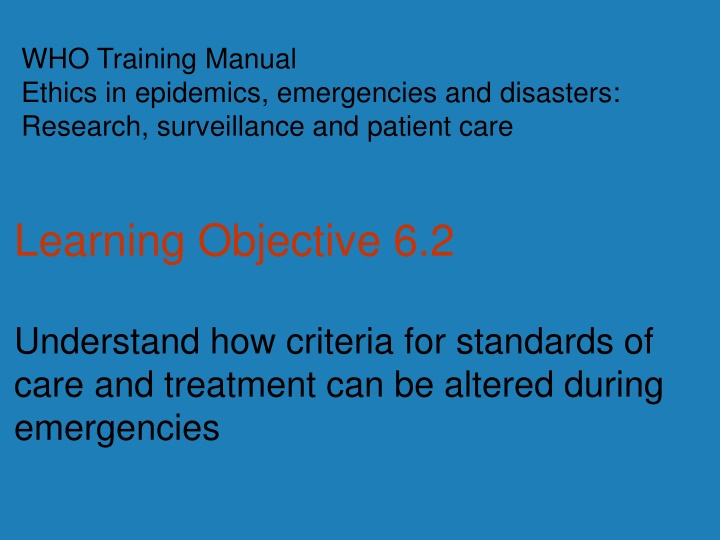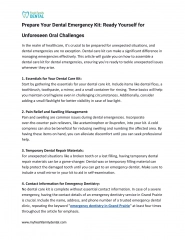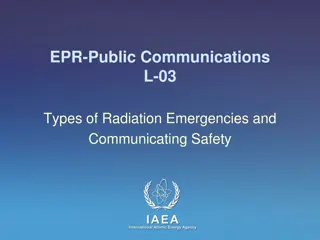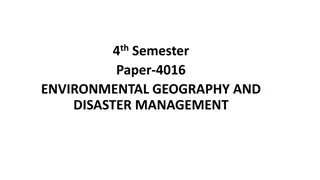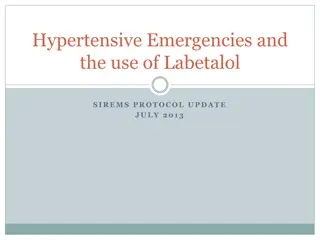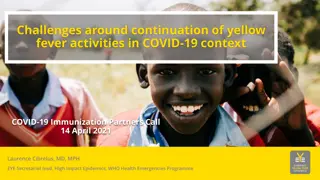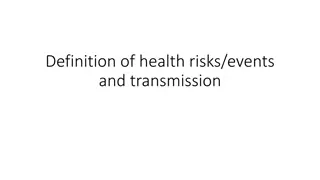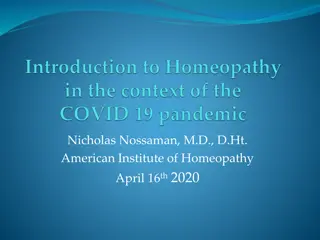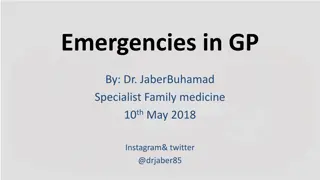Ethics in Epidemics and Emergencies: Altered Standards of Care
Alteration of standards of care during emergencies, including factors influencing changes, ethical implications, and case studies. Learn about the considerations in balancing triage and maintaining equity in public health emergencies.
Download Presentation

Please find below an Image/Link to download the presentation.
The content on the website is provided AS IS for your information and personal use only. It may not be sold, licensed, or shared on other websites without obtaining consent from the author.If you encounter any issues during the download, it is possible that the publisher has removed the file from their server.
You are allowed to download the files provided on this website for personal or commercial use, subject to the condition that they are used lawfully. All files are the property of their respective owners.
The content on the website is provided AS IS for your information and personal use only. It may not be sold, licensed, or shared on other websites without obtaining consent from the author.
E N D
Presentation Transcript
WHO Training Manual Ethics in epidemics, emergencies and disasters: Research, surveillance and patient care Learning Objective 6.2 Understand how criteria for standards of care and treatment can be altered during emergencies
Outline 1. Introduction distinction between triage/resource allocation and altered standard of care 2. Case study 1 Reading Video Group Discussion 3. Case study 2 Reading Small group discussion Large group Discussion 4. Wrap-up Time (minutes) 0-10 (10 min) 11-30 (20 min) 31-75 (45 min) 76-90 (15 min) Introduction Case Study 1 Case Study 2 Summary and conclusion Activities Reading Video Group Discussion Reading Small group discussion Large group discussion L.O. 6.2
Standard of Care Standard of care refers to treatment recognized by professional consensus as adequate for a given condition Legal implications may be sued for malpractice if fail to provide standard of care Ethical implications consider whether it is acceptable for standard to vary according to circumstances L.O. 6.2
Factors affecting standard of care Factors leading to altered standard of care in a public health emergency: Logistical constraints Increased availability of unproven treatments Variability in risk aversion Research with controlled arms Variability of coverage by public sector L.O. 6.2
Standard of care in emergencies SOC may need to be compromised in public health emergencies May need to decide between triaging/rationing versus reducing the SOC for all to maintain equity When SOC is lowered, conducting clinical trials may be more affordable Unethical to divert resources away from clinical care to research as may reduce SOC What should be the SOC be in international medical research? (e.g. control groups in comparative treatment trials) L.O. 6.2
Case study 1- reading The deadly choices at Memorial by S. Fink in New York Times Magazine 25 August, 2009 (first 2 pages) http://www.nytimes.com/2009/08/30/magazine/30doctor s.html (5 min) L.O. 6.2
Case study 1 - video Morley Safer interviews Dr. Pou on CBS News 60 Minutes programme http://www.cbsnews.com/video/watch/?id=2040496n&ta g=mncol;lst;1 (4 min 30 sec) L.O. 6.2
Case study 1 group discussion What was Dr. Pou s moral dilemma? Who among you sympathizes with Dr. Pou vs. Who thinks she is guilty ? What do you mean by guilty in this case? Are there differences between moral and legal responsibilities at play here? (10 min) L.O. 6.2
Case study 2 - reading Scenarios 2 and 5 from: Levin et al. Altered standards of care during an influenza pandemic: identifying ethical, legal, and practical principles to guide decision making. Disaster Medicine and Public Health Preparedness, 3 (Suppl.2), S132- S140.(2009) Read scenarios Write down brief individual reflections L.O. 6.2
Case study 2 - Context It is 6 weeks into an influenza pandemic, and the health care system has been taxed beyond capacity, with every hospital bed full, every ventilator in use, and all health care providers working extended shifts. To increase the number of available beds to accommodate the surge of influenza patients, all scheduled operations have been postponed for the past 2 weeks. L.O. 6.2
Case study 2 - Issues The postponed procedures include diagnostic and palliative operations for patients with pancreatic cancer, ovarian cancer, and malignant brain tumors, among other diseases. For many of these patients, their expected survival is less than 6 months, but without immediate operations, they will likely die within 2 weeks. As a result of the pandemic, medical resources are scarce, and the usual critical care that would follow those operations cannot be provided to all in need. Hospitals across the country are independently making decisions to govern how to modify standards of critical care to provide limited but high-yield critical care interventions and processes for many additional patients. Hospital A: Providing critical care according to usual standards on a first- come, first-served basis. Hospital B: Providing key critical care interventions only to those patients with an expected survival of more than 6 months. L.O. 6.2
Case study 2 Dr Smith As a surgeon, Dr Smith deeply opposes hospital B s decision to provide key critical care interventions only to those patients with an expected survival of >6 months. This new rule requires that Dr Smith cancel a bowel obstruction surgery scheduled for later this week. Without surgery, his patient a 36-y-old mother of 3 with ovarian cancer will die within 2 weeks. Dr Smith is considering performing the operation in violation of hospital rules, potentially risking his career. In light of his disagreement with recent hospital policies, Dr Smith is torn between his professional mission to use his skills and expertise to help the patients who need him, and his obligation to observe the rules of his institution. L.O. 6.2
Case study 2 group discussions In groups of 3 or 4: Discuss the case Determine what Dr. Smith should do (i.e. performing the operation in violation of hospital rules or not) and why Present your conclusions L.O. 6.2
Case study 2 additional information 2 stakeholder meetings held in July 2006 one for consumers and one for healthcare professionals Each attended by 15 Massachusetts residents Each meeting lasted 4 hours professionally facilitated discussion of scenarios L.O. 6.2
Case study 2 Stakeholders reactions Both groups expressed importance of healthcare providers being advocates for their patients Providers particularly opposed Dr Smith violating hospital policy Providers acknowledged that a surgeon s decision to violate hospital rules would implicate a number of others in the process Identified need for improved systems within hospitals to support physicians in the event that rules governing the allocation of critical care interventions are introduced, e.g. liability, protection, mental health support. L.O. 6.2
Summary Establishing the standard of care is always challenging, especially in public health emergencies Need a standard of care which respects the dignity of patients but takes into account resource limitations Triage and resource allocation will impact on the care patients receive Participation in research could allow access to some forms of care when triage rules unfavourably This raises ethical questions regarding voluntariness L.O. 6.2
Sources Selgelid M. (2005). Module four: standard of care and clinical trials. Developing World Bioethics, 5(1): 55-72. Annas GJ. Standard of care In sickness and in health and in emergencies. (2010). The New England Journal of Medicine, 362(22), 2126-2131. Okie S. (2008). Dr. Pou and the hurricane implications for patient care during disasters. New England Journal of Medicine, 358, 1 5. Gebbie KM, Peterson CA, Subbarao I, White KM. (2009). Adapting standards of care under extreme conditions. Disaster Medicine and Public Health Preparedness, 3(2), 111-116. Fink S. The deadly choices at Memorial. New York Times Magazine, August 25, 2009, 28-46. http://www.nytimes.com/2009/08/30/magazine/30doctors.html Nossiter A. Grand Jury Won t Indict Doctor in Hurricane Deaths. New York Times, July 25, 2007. http://www.nytimes.com/2007/07/25/us/25doctor.html?scp=1&sq=Grand%20Jury%20Won%92t%20Indict%20Doctor %20in%20Hurricane%20Deaths&st=cse. US Department of Health and Human Services, Agency for Healthcare Research and Quality. 2005. Altered Standards of Care in Mass Casualty Events. http://www.ahrq.gov/research/altstand. Levin D, Cadigan RO, Biddinger PD, Condon S, Koh HK, on behalf of the Joint Massachusetts Department of Public Health-Harvard Altered Standards of Care Working Group. Altered standards of care during an influenza pandemic: identifying ethical, legal, and practical principles to guide decision making. (2009). Disaster Medicine and Public Health Preparedness, 3(Suppl.2), S132-S140. http://journals.cambridge.org/action/displayAbstract?fromPage=online&aid=8844907&fulltextType=RA&fileId=S19357 89300002184 L.O. 6.2
Acknowledgements Chapter authors Calain, Philippe, M decins Sans Fronti res, Geneva, Switzerland Boulanger, Renaud F., Faculty of Medicine, McGill University, Montr al, Qu bec, Canada L.O. 6.2
